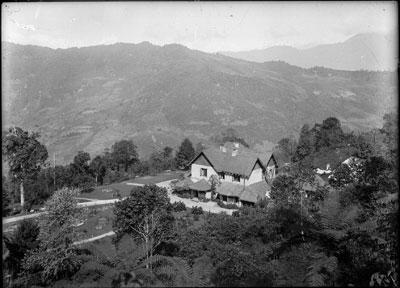
1998.285.5 (Glass negative)


1998.285.5 (Glass negative)

Sir Charles Bell or Rabden Lepcha
Sir Charles Bell
November 1921
Sikkim > Gangtok > British Residency
1998.285.5
120 x 163 mm
Negative glass plate gelatin , Negative Half Plate
Donated 1983
St Antony's College, Oxford.
Lantern
Sir Charles Bell's Mission to Lhasa 1920-21
Royal Central Asiatic Society
H.6 [view film roll]
BL.H.6
British Library, Oriental and India Office Collections
Manual Catalogues - Bell's List of Illustrations entry: "[No. of chapter] 1. [Subject of Chapter] Sikkim. [Subject of illustration] H6 (q) The Residency, Gangtok, in 1921. [Remarks] L2 [lantern slide 2]"
Other Information - Dates: In 1904 and 1906-1907 Sir Charles was temporarily in charge of the administration of Sikkim. He was made Political Officer of Sikkim, Bhutan and Tibet in 1908 and remained in this position until 1918, being based at Gangtok in the Residency. Some of the photographs in his collection were taken during this period. However, Bell returned to Gangtok when he left Lhasa, reaching the town on November 10th 1921 and it seems from his caption that this photograph was taken around that date [MS 21/9/2004]
Other Information - Description: "Gangtok, the capital of Sikkim. During recent years this village on the mountain side, one of the world's smallest capitals, has acquired a share in the Tibetan trade. When I was in Sikkim, we arranged camping-grounds with fuel, fodder and water at convenient stages along the mountain tracks, a site for warehouses in the vicinity of Gangtok while the administration of the State was regularized more or less on British lines. So the Tibetan traders, who value just laws and a stable administration, even though of foreign make, have begun gradually to use Gangtok as a trading centre." 'The People of Tibet', Bell, C. A., Oxford: Clarendon Press, 1928, p.113
For Citation use:
The Tibet Album.
"British Residency, Gangtok, in 1921"
05 Dec. 2006. The Pitt Rivers Museum.
<http://tibet.prm.ox.ac.uk/photo_1998.285.5.html>.
For more information about photographic usage or to order prints, please visit the The Pitt Rivers Museum.
© The Pitt Rivers Museum